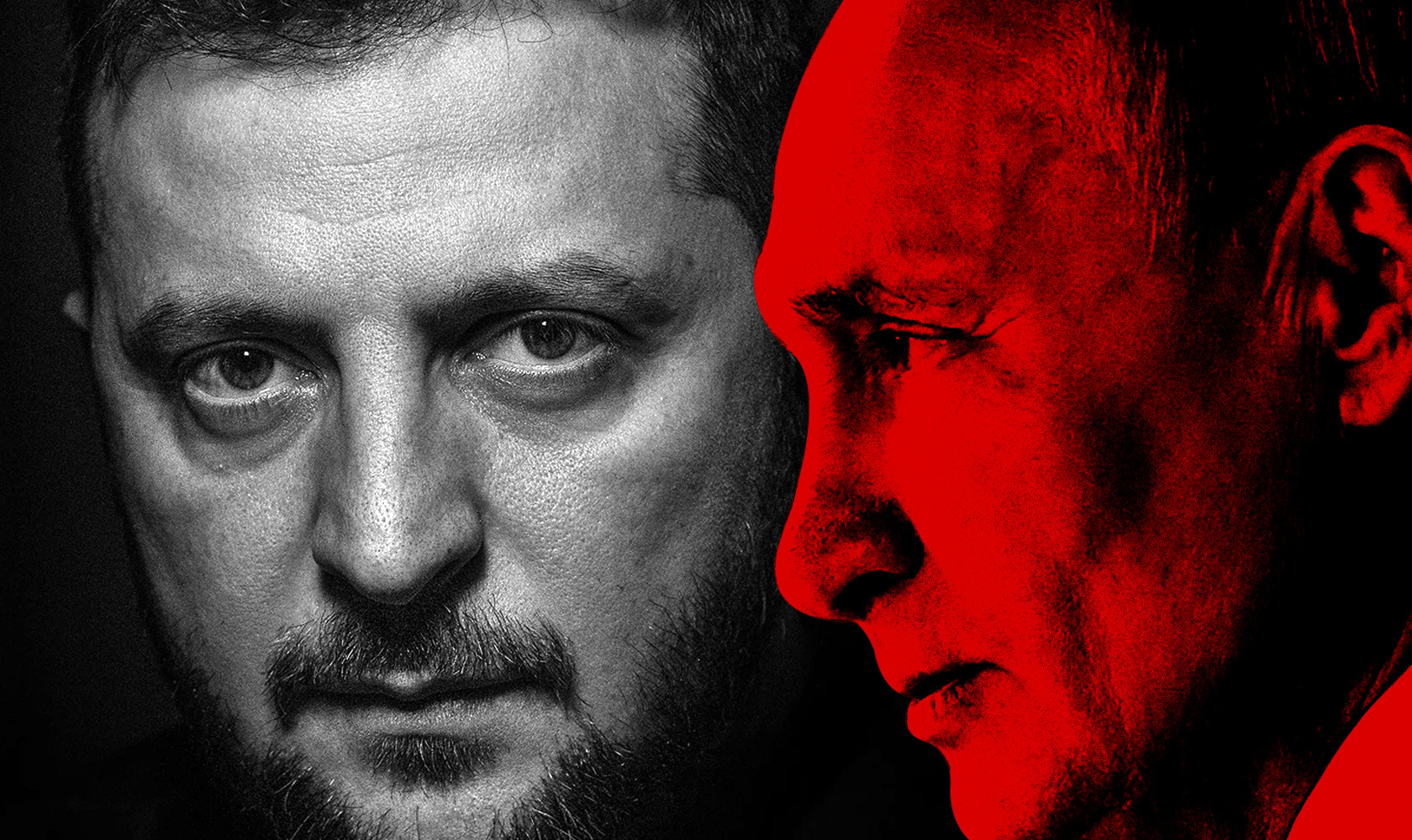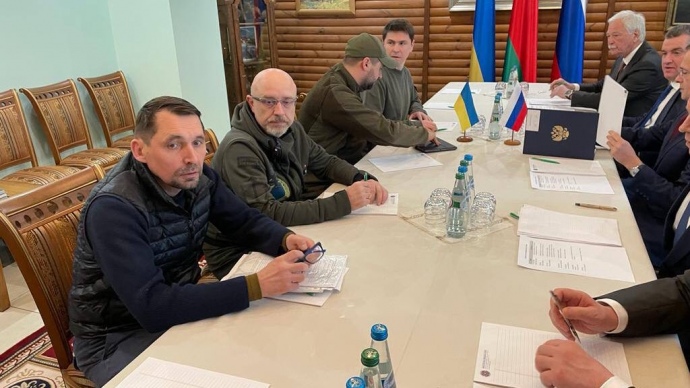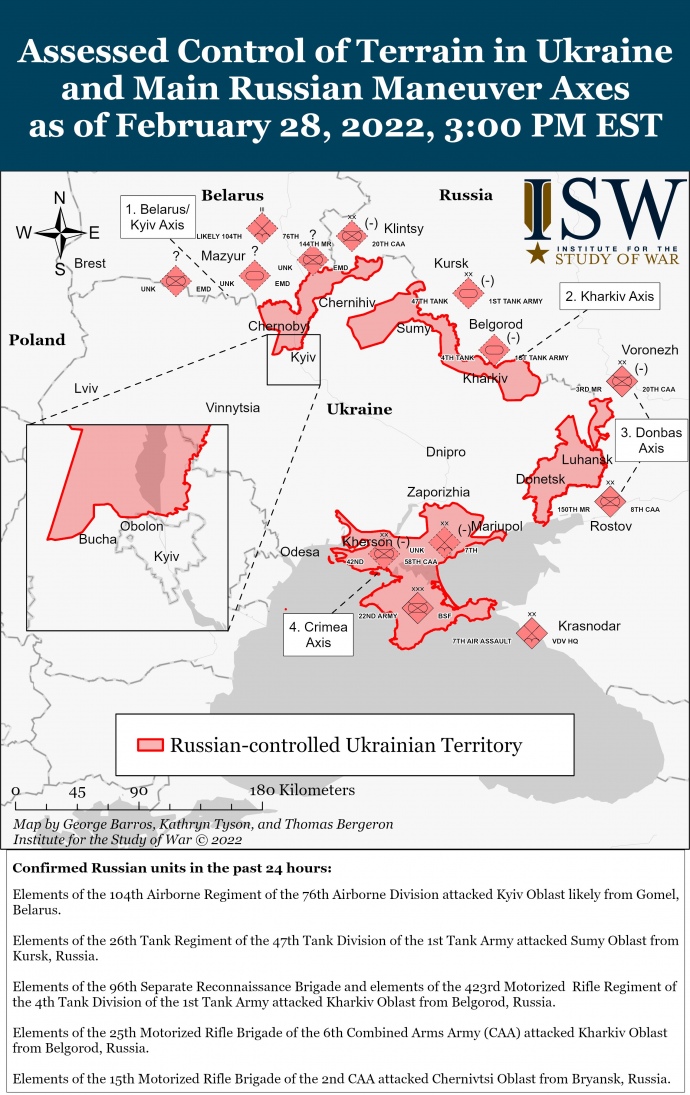From Zelenskyy’s “surrender” to Putin’s surrender: how the negotiations with Russia are going
The peace talks with Russia are the story of how Ukraine has gone from despair to realising its own strength and its circle of true allies over 70 days of full-scale war.

“If on the first day of the war we had been allowed to sign a version of the peace agreement like the one we have now, we would have done it without a second thought. But now the agreement seems too much of a compromise for our side”, a member of President Zelenskyy’s inner circle shared strictly off the record in a conversation with Ukrainska Pravda.
Generally speaking, Ukraine’s readiness for some form of tactical surrender in the early hours of the attack has given way to the first attempts to outline Russia’s future defeat.
It is obvious that public recognition of such scenarios would be too brave a step for Zelenskyy’s team now. But in the cabinets of the President’s Office, this course of events is no longer discussed as a fantasy, but as a real thing. Or, to be more precise, a thing that Ukraine can make real.
Zelenskyy’s belief in this is compounded by two major changes in global politics.
First, the myth of the “power” of Vladimir Putin and his army is gradually being crushed in the outskirts of Irpin and Rubizhne.
Secondly, the isolationism of the West and its reluctance to really help Ukraine have been finally buried in the mass graves of Bucha, Borodianka and Mariupol.
Ukrainska Pravda found out how these two changes are affecting the course of the peace talks with Russia, who is talking to whom, and how Boris Johnson’s emergency visit changed the course of events.
72 hours to surrender
Vladimir Putin had to conquer Ukraine in 72 hours. Ukraine had only one option – to surrender.
These two simple sentences could sum up the starting point of the Russian-Ukrainian war and, accordingly, the peace talks.
For those who doubt their veracity, it should be clarified that it was our partners from the West, not the Kremlin, who reported this scenario for Kyiv and Zelenskyy.
“So you understand, Zelenskyy received the first offer to leave Ukraine and form a government in exile before the full-scale war. This offer was sincerely made to the president during the Munich conference. And they said it was better [for Zelenskyy] not to return to Ukraine”, a member of the delegation in Munich told Ukrainska Pravda in confidence.
Zelenskyy was asked to choose either Warsaw, or London, or any other place for his “residence”. To the surprise of all the partners, the president returned to Ukraine.
“I had breakfast in Ukraine this morning and I will have dinner in Ukraine“, Zelenskyy said then, shocking the audience at the meeting, perhaps no less than with his famous speech criticising the West.
The partners’ position was understandable: they knew about Putin’s preparations, they knew about his army’s plans, they knew what missions were being sent in staff envelopes to the commanders of various levels in the 120 strike battalion-tactical groups gathered around Ukraine. And they “knew” that Ukraine didn’t stand a chance.
“At first we did not know the exact plans of the Russian Federation. But when we seized the staff documents from dead Russian commanders near Kyiv, we understood everything. It was all noted there – when and where the particular group should be, and elite paratroopers had to clear the government quarter in Kyiv within 72 hours. The same 72 hours that all our partners had told us about”, one of Zelenskyy’s top “security officers” explained in a conversation with Ukrainska Pravda.
One day passed, the second day passed, and the third – and Kyiv was still standing. The woods around the capital were filled with burnt Russian armour and the corpses of soldiers – and Kyiv was still standing. The airfields of Hostomel and Vasylkiv were on fire, Russian helicopters were flying in and falling – and Kyiv was still standing.
“Eventually, on the third day, we felt, maybe even realised, that we would survive. That we do have the strength. It wasn’t until the third day that we had time to get out of the shelter for the first time“, said a top representative of the presidential team.
And just after the third day, on the morning of 27 February, Russia and Ukraine announced the start of negotiations.
“Istanbul Peace”
The first phase of Putin’s plan failed, and the blitzkrieg by the “world’s second greatest army” failed. But Russia’s president still believed he had enough strength to force Ukraine to surrender during the talks.
As Davyd Arakhamia, the leader of the Ukrainian negotiating team, said in an interview, Zelenskyy’s first task was to give the Russians the impression that Ukraine was ready to negotiate.
“The task was set so that a successful outcome would be the feeling that the Russian delegation would return home and report to their president that it is possible to talk to these people (members of the Ukrainian delegation – UP) and they could consider something,” said Arakhamia.
But the Russians came to the first round of talks not to talk, but to formalise Ukraine’s surrender.
“To cut a long story short, the essence of that agreement, David [Arakhamia] has it somewhere, is that we [Ukraine] are just giving up. And denazification and the rest [of the Russian side’s demands] are on top of all that“, said one member of the delegation.
It is clear that the delegation had neither the power nor the authority to comply with such demands. Especially since the instructions they had been given by the president were totally different.
“Our delegation went to the first meeting on 28 February with instructions that clearly stated that Russia must return to the borders as of 23 February, that is, no new occupation, withdrawal of troops and so on“, says one of the leading members of Zelenskyy’s team who was involved in preparing for the negotiations.
However, Arakhamia and Co. [the delegation] fulfilled the President’s main task: contact was established with Vladimir Medinsky [Putin’s chief negotiator] and, it must be said, is ongoing.
Although this official channel of negotiations is not the only one at work on a peace treaty with Russia. Another participant in the Kyiv-Moscow talks – behind the scenes – is Russian billionaire Roman Abramovich.
“Roman has also been in contact with Arakhamia. His advantage is that he is probably the only one who has direct access to Putin. He [Putin] meets with him in person wherever he is. The entire [Russian] official delegation have only seen their boss on TV. Medinsky can talk to Putin – but only on the phone”, says Ukrainska Pravda’s source on Bankova [the street where the Presidential Office is located in Kyiv], who is familiar with the negotiations.
An interesting story about Medinsky’s level of access to Putin was told by the Russian investigative publication Proekt, founded by former Dozhd journalists [Dozhd, also known as TV Rain, is an independent Russian television channel that was shut down on 1 March 2022 by the Russian government]. According to Proekt, after the famous speech about the Istanbul Agreement, when Medinsky began to be torn apart by official propaganda for sticking to the government’s official objective, he tried to call Putin. But the phone was not picked up for a whole day.
By the way, about Istanbul. This is the key point of the Russian-Ukrainian talks today.
The points of the agreements raised by Medinsky after the Istanbul meeting are in fact true.
“We cleaned up all the nonsense about “denazification”, “demilitarisation”, the Russian language and so on. We noted there that Ukraine was not ready to join NATO in exchange for tough and clear security guarantees. A framework for the agreement was prepared.
But then the delegations simply could not move further. We say, guys, the issue of Crimea and Donbas is about territorial status. No one here is authorised to even talk about it. Let the presidents meet and decide where to go. We need a meeting between the leaders”, said one of the sources on Bankova.
This meeting was almost prepared. After very heavy losses near Kyiv and in the north, after months of unsuccessfully besieging Chernihiv and Kharkiv, and after tough Western sanctions, Russia desperately needs an agreement with Ukraine.
There’s a reason why Russian Foreign Minister Sergei Lavrov is making out that what Russia wants is valid, saying that Russia is negotiating with Ukraine to lift sanctions. This is an extremely important issue for them.
The West, through German Chancellor Olaf Scholz, gave a definite answer – no one will lift sanctions on Russia unless there is an agreement with Ukraine.
“Boris Johnson”, or “Put Pressure” on Putin
The Russian side, no matter what anyone says, can read signals and was actually ready for the Zelenskyy-Putin meeting.
But two things happened, after which Mykhailo Podoliak, a member of the Ukrainian delegation, had to openly admit that now was “not the time” for a meeting between the presidents.
The first thing was the revelation of the atrocities, rapes, murders, massacres, looting, indiscriminate bombings and hundreds and thousands of other war crimes committed by Russian troops in the temporarily occupied Ukrainian territories…
How and what can we talk about with Putin, if we cannot talk to him about Bucha, Irpin, Borodianka or Azovstal?…
The moral gap, the gap in values, between Putin and the rest of the world is so huge that even the Kremlin doesn’t have a long enough negotiating table to cover it.
The second – much more unexpected – “obstacle” to agreements with the Russians arrived in Kyiv on 9 April.
…
As soon as the Ukrainian negotiators and Abramovich/Medinsky, following the outcome of Istanbul, had agreed on the structure of a future possible agreement in general terms, UK Prime Minister Boris Johnson appeared in Kyiv almost without warning.
“Johnson brought two simple messages to Kyiv. The first is that Putin is a war criminal; he should be pressured, not negotiated with. And the second is that even if Ukraine is ready to sign some agreements on guarantees with Putin, they are not. We can sign [an agreement] with you [Ukraine], but not with him. Anyway, he will screw everyone over”, is how one of Zelenskyy’s close associates summed up the essence of Johnson’s visit.
Behind this visit and Johnson’s words, there is much more than a simple reluctance to get involved in agreements with Russia.
Johnson’s position was that the collective West, which back in February had suggested Zelenskyy should surrender and flee, now felt that Putin was not really as powerful as they had previously imagined.
Moreover, there is a chance to “press” him. And the West wants to use it.
Three days after Johnson, now the happy owner of a Vasylkiv rooster, flew back to foggy Albion, Putin went public and said talks with Ukraine “had reached a dead end”.
“We reached a certain level of agreement in Istanbul, which was that security guarantees for Ukraine… would not extend to the territory of Crimea, Sevastopol and Donbas … Now security guarantees are one thing, and the issue of regulating relations with Crimea, Sevastopol and Donbas is being pushed out of these agreements”, Putin said.
Three days later, Roman Abramovich arrived in Kyiv again, and President Zelenskyy officially stated that there could be two security agreements with Russia: one would regulate Ukraine’s own coexistence with Russia, the other would only cover security guarantees.
“Moscow would like to have a single agreement in which all the issues are resolved. However, not everyone sees themselves at the same table with Russia. For them, security guarantees for Ukraine is one issue, and agreements with Russia is another issue.
Russia wants everything to be in one document, and people are saying, ‘I’m sorry, we saw what happened in Bucha, the circumstances are changing’,” Zelenskyy relayed Johnson’s message to Putin.
After that, the bilateral negotiation process was put on hold.
The parties had to decide how to cooperate going forward, how to get all potential security guarantors involved in the negotiations, and who they will be.
And most importantly, Ukraine has had to understand for itself the answer to the fateful question: how ready is the West to stand with Ukraine in the confrontation with Russia?
Won’t Ukraine end up being deceived and destroyed, left face to face with the angry Kremlin?
The future of the negotiations, the war and the history of 21st-century Europe also depend on the answer to this question.
And the answer to such a complex question is worth a separate article, which you will soon be able to read on Ukrainska Pravda.
Roman Romaniuk, UP
Source:pravda.com.ua/



